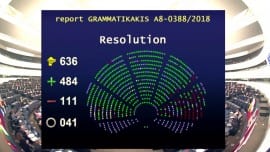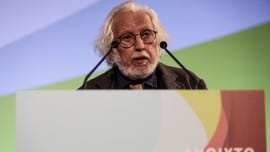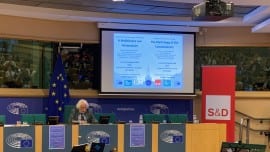“High youth unemployment rates, reported in many European countries, especially in Greece, they must have lead European institutions to declaring a state of emergency, like the one cause by terror attacks. Besides, youth unemployment is also a long-term threat to the future of Europe,” stated Giorgos Grammatikakis, MEP of Potami.
“High youth unemployment rates, reported in many European countries, especially in Greece, they must have lead European institutions to declaring a state of emergency, like the one cause by terror attacks. Besides, youth unemployment is also a long-term threat to the future of Europe,” stated Giorgos Grammatikakis, MEP of Potami.
The Committee of Culture and Education of the European Parliament held an “Inter-parliamentary meeting on Education and Young People”. The meeting, which took place in Brussels, was marked with success. Representatives of the Member States of the European Union, MEPs, as well as youth organizations, participated in the meeting. Institutional representatives of the European Commission and the Council also attended the meeting, among them Tibor Navracsics, Commissioner for Education, Culture, Youth and Sport and Claude Meisch, Minister of Education in Luxembourg, currently holding the Presidency of the Council of the European Union.
To Potami MEP Giorgos Grammatikakis, and Member of the Committee of Culture, stated:
“I paid great attention to the speeches of the institutional representatives, as well as the speech of Silvia Costa, Chairman of the Committee of Culture and Education in the European Parliament. I do not doubt the efforts that have already been made. Yet, the path ahead us is long. Because, while EU decision makers point out the importance of Culture and Education, the funds assigned to these purposes are not enough. Several financing and functional problems even affect the Erasmus exchange program, which has been the definition of success. Therefore, it is necessary for us to pass from big words and resonant statements to honesty and genuine concern. We should consider how hard these problems are and to what extent bureaucracy and the structure of the European Union make these problems even harder to resolve.
But, in this deep crisis, which has been distressing Europe and has been worsened by the threat of terrorism, the answer must be one; wider and better Education, focusing on civilization.
In this framework, I feel the need to point out a painful truth. In many European countries, youth unemployment rates are so high, leading young people to despair and denial. In my country, in Greece, according to the official figures released by Eurostat in 2015, youth unemployment rises to the inconceivable 50,1%. Forgive me, if this sounds provocative, but, this situation must have led Europe to declaring the ultimate state of emergency, in its institutions. Just like in Brussels, because of the terror attack. Youth unemployment is another kind of threat, one of different texture, which still undermines the future of Europe.
There is one more thing to point out. In 2014 European elections, only 28% of young people, aged between 18 and 24, went to the polls. This alarmingly low turnout rate is not consistent with the fact that 75% of students embrace their European identity. So, there is responsibility to share for the fact that young people are in favor of Europe, but not interested in its institutional procedures.
It is clear that what is missing is a real vision for Europe itself, as well as its education. Tackling unemployment is not enough. Neither is launching better coordination, or changing educational structures. What is really missing is the motivational force of history, i.e. ideas and people who express them.
Despite the magnitude of current problems, I want to remain optimistic. For one simple reason. The values on which this major experiment of the European Union has been built, they have been tested throughout history, but they remain unwavering. Promoting these values, thus creating conscious European citizens, who will feel united amid diversity, is the actual challenge of our era. If education and civilization are used as our main weapons in this path, it is certain that tomorrow’s Europe will be much better. Multiple risks that threaten Europe today will be set aside and new, and new life-giving perspective will be created.







